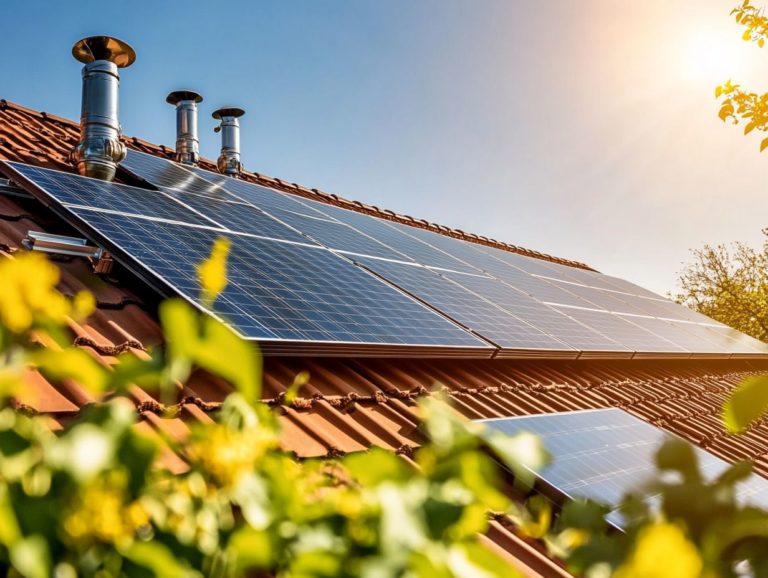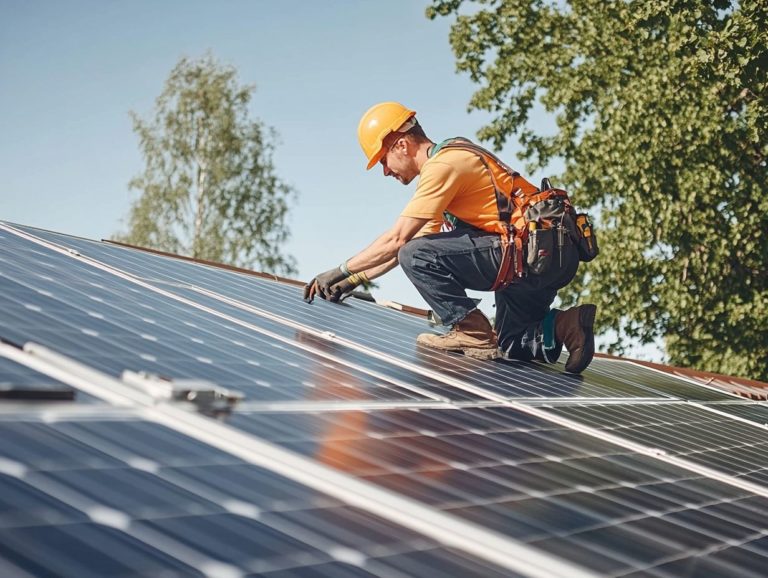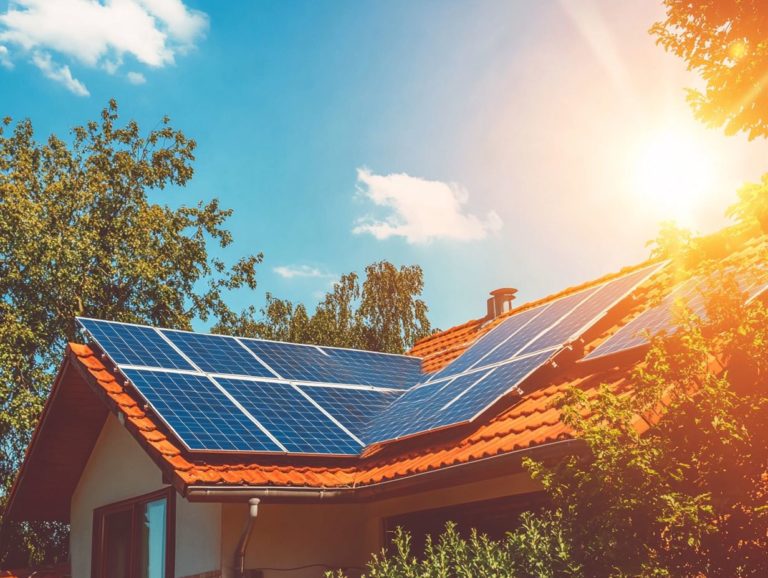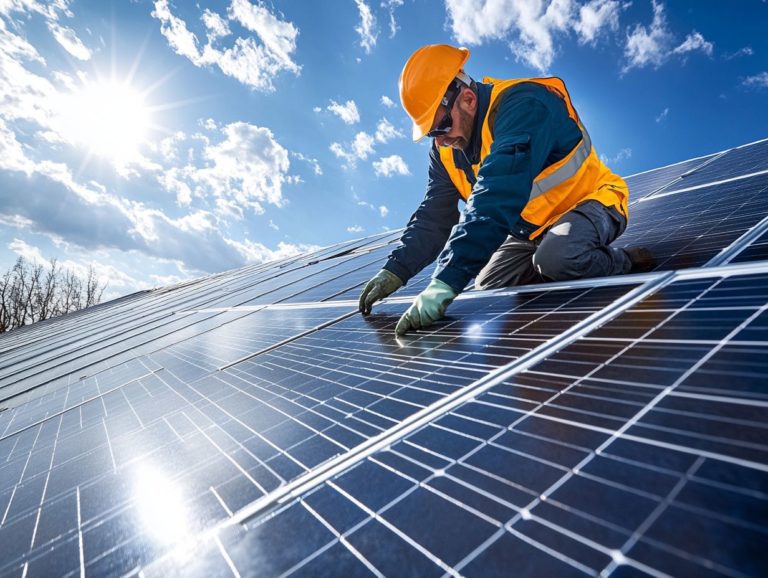“Benefits of Installing Solar Panels at Home”
Solar panels are not merely a passing trend; they symbolize a profound transition toward sustainable living and energy independence.
This article explores the many benefits of installing solar panels in your home, ranging from the positive environmental impact of reducing your carbon footprint to substantial financial savings on your energy bills.
It also explains the installation process and offers maintenance tips to ensure your system operates at peak efficiency. Furthermore, it dispels common misconceptions that might be holding you back.
Discover the exciting benefits of embracing solar energy and take a step toward a brighter, more sustainable future.
Contents
Key Takeaways:
- Solar panels reduce carbon footprint and combat climate change, making them an environmentally friendly choice for homeowners.
- Installing solar panels can provide financial benefits, such as saving money on energy bills and potentially qualifying for tax incentives.
- Careful consideration of installation costs and regular maintenance can help homeowners maximize the efficiency and longevity of their solar panels.
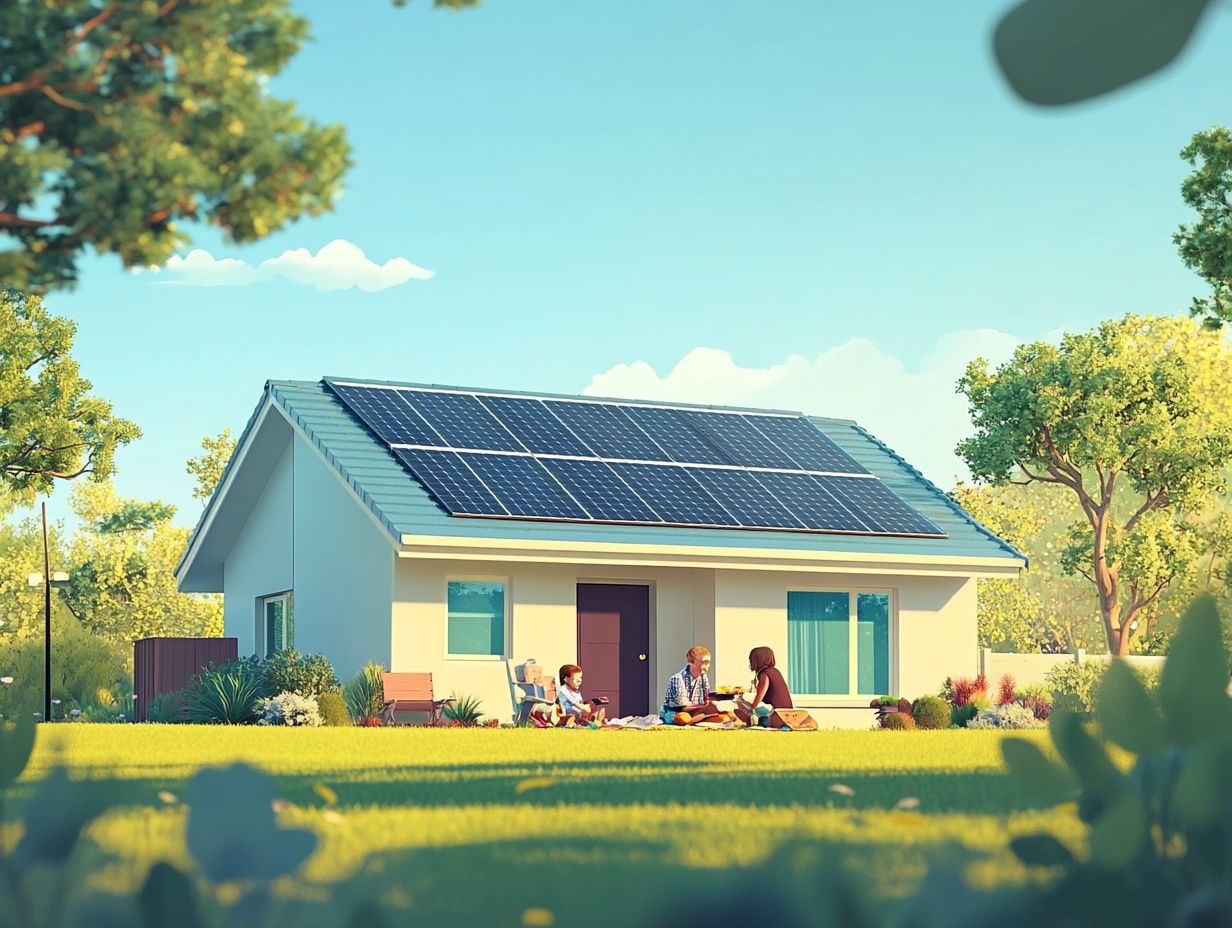
What are Solar Panels and How Do They Work?
Solar panels, also known as photovoltaic (PV) cells, are your gateway to harnessing the sun s power and transforming it into electricity. This innovative technology not only provides you with a sustainable and eco-friendly energy solution but also aligns perfectly with the growing demand for renewable resources.
By utilizing the way sunlight creates electricity, sunlight interacts with the cells, sparking an electric current that can energize your home, business, or even contribute back to the grid. This shift is crucial in moving away from fossil fuels and curbing carbon emissions.
These solar panels consist of several essential components: silicon cells, a protective backing, and a glass front that allows sunlight to flood in while safeguarding the internal elements.
When sunlight’s photons collide with the silicon cells, they set electrons in motion, generating an electric flow. This entire process boosts energy efficiency, turning free sunlight into usable electricity and significantly reducing your reliance on the grid.
As more people and organizations embrace solar technology, the collective impact on diminishing carbon footprints becomes strikingly evident. This movement showcases a tangible path toward a cleaner, more sustainable future for all.
Environmental Benefits of Solar Panels

The environmental benefits of solar panels are truly remarkable. They significantly reduce carbon emissions and are essential in the fight against climate change by harnessing renewable energy sources.
By making the transition to solar energy, you can substantially lower your carbon footprint and embrace eco-friendly living practices that contribute to a sustainable future. This choice not only benefits the planet but also sets a powerful example for others to follow.
Reducing Carbon Footprint and Combatting Climate Change
Reducing your carbon footprint is paramount in the battle against climate change, and embracing solar energy is a key player in this mission. By choosing solar panels, you not only generate electricity without the harmful emissions typical of fossil fuels, but you also enhance energy independence, enabling you and your community to contribute to a greener future.
When you harness the sun’s abundant power, you can significantly reduce your reliance on non-renewable resources. This transition not only results in lower greenhouse gas emissions but also aligns perfectly with global initiatives aimed at promoting sustainability.
As more individuals and businesses adopt solar technology, the overall demand for fossil fuels decreases, creating a ripple effect that propels us toward a low-carbon economy. The widespread adoption of solar energy fosters innovation in energy storage solutions, simplifying the process for communities to stabilize their energy supply while staying committed to climate goals.
Take action now and be part of the solar revolution!
Financial Benefits of Solar Panels
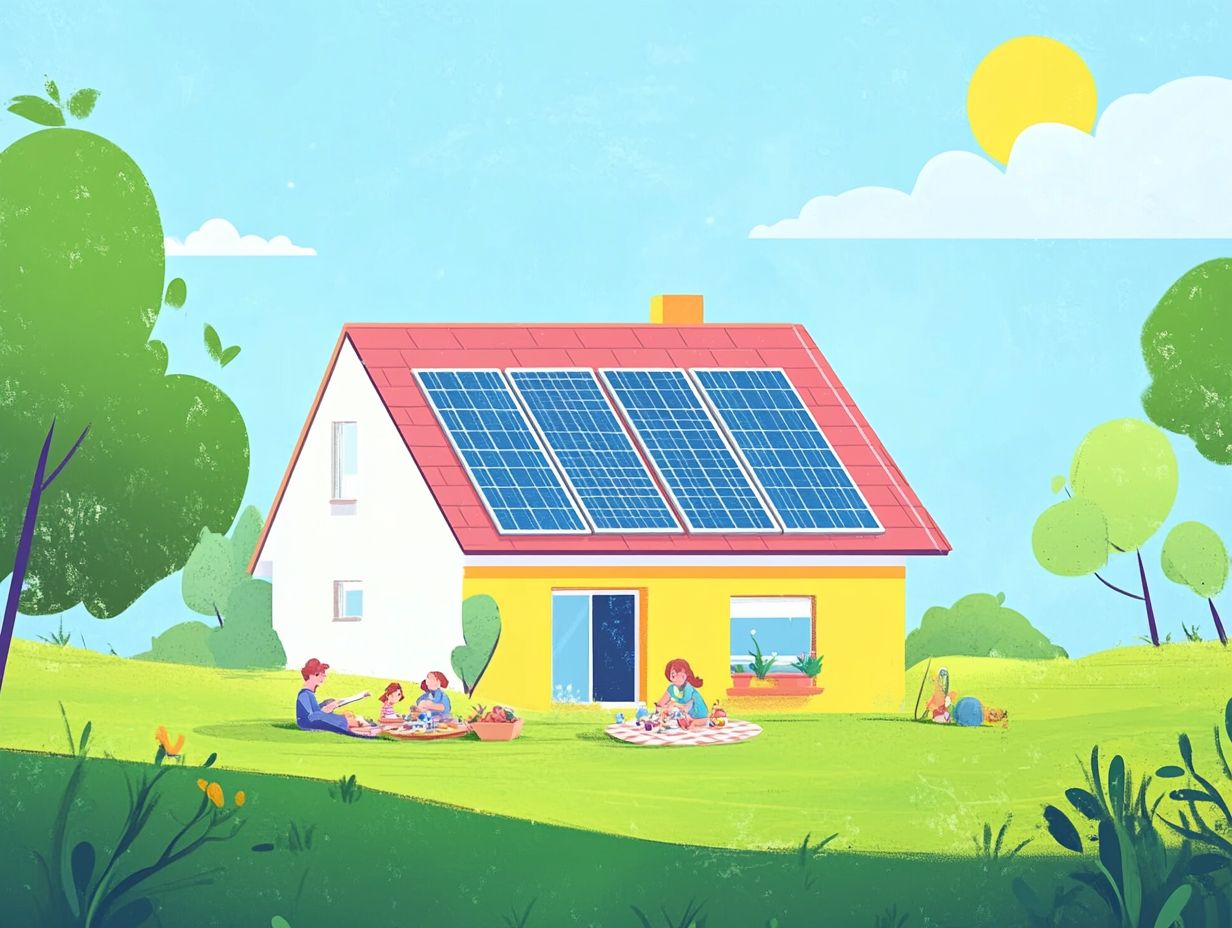
The financial advantages of solar panels are compelling. They offer substantial savings on energy bills and provide opportunities for government incentives that can significantly offset installation costs.
Investing in solar panels not only cuts utility bills but also boosts your home’s value. It’s a smart move for a reliable energy source!
Saving Money on Energy Bills and Potential Tax Incentives
One immediate financial advantage of installing solar panels is the remarkable reduction in your energy bills. This allows you to save money while harnessing a renewable energy source.
With potential tax incentives and government grants available, installation costs can be significantly reduced, making solar power an increasingly appealing investment. Imagine saving 30% or more on your electricity bill every month after switching to solar!
Over the lifespan of the system, this can translate into substantial savings thousands of dollars, in fact. Besides these immediate savings, you can benefit from various tax incentives, such as the Federal Solar Investment Tax Credit, which lets you deduct a significant percentage of installation costs from your federal income taxes.
Some states even offer additional credits and rebates, further increasing the financial appeal of solar energy. Together, these savings and incentives not only reduce your upfront expenses but also promote long-term financial sustainability and independence from the unpredictable nature of energy prices.
Installation and Maintenance of Solar Panels

The installation and maintenance of solar panels are critical elements that significantly impact their efficiency and longevity.
A well-executed installation process ensures optimal energy output throughout the system’s lifespan, which can extend to 25 years or even beyond.
While proper maintenance is typically low-cost, it is crucial for maximizing performance and protecting your investment in solar technology.
Costs and Considerations for Installation
When considering solar panel installation, it s essential to understand the associated costs and the factors that influence these expenses. Installation costs can vary greatly depending on the type of solar power system you choose, the complexity of the installation, and the government incentives available to help offset these costs.
Choosing between different types of solar panels, like the shiny ones (monocrystalline) and the more affordable ones (polycrystalline), can greatly change your costs. Local regulations, including permits and zoning laws, also play a crucial role in determining your final costs, as compliance may sometimes come with extra fees.
You have financing options to consider, such as leases, power purchase agreements, and loans, which allow you to spread out payments over time, making solar adoption more accessible.
Understanding these variables aids in budgeting effectively and helps you navigate the solar market to find the best fit for your unique needs.
Tips for Maintaining and Maximizing Efficiency
To ensure your solar power system operates at peak performance, implement effective maintenance strategies that minimize costs while maximizing energy efficiency.
Regularly cleaning your solar panels and inspecting the solar battery can significantly enhance their energy output, allowing you to make the most of renewable energy.
Incorporating a routine cleaning schedule every few months helps eliminate dirt, debris, and bird droppings that might hinder your solar panel efficiency.
You should also monitor the energy output, checking how much energy your system is producing using the display on your solar panel system or an app on your phone. This will provide valuable insights into your system s performance and alert you to any potential issues.
Equally important is assessing the health of your solar batteries, as their capacity directly influences your overall energy storage and consumption. You can extend the life of your batteries by maintaining an optimal charge level and protecting them from extreme temperatures.
By adopting these proactive measures, you can fully leverage the benefits of solar technology in your home.
Common Misconceptions About Solar Panels
Despite the increasing allure of solar technology, several prevalent misconceptions still cloud public perception, especially regarding the effectiveness and viability of solar panels as a sustainable energy solution.
Many people worry about solar energy’s reliability, often citing concerns about grid dependence or high initial costs. This doubt may stop people from investing in solar power.
Debunking Myths and Addressing Concerns
Addressing and debunking myths surrounding solar panels is crucial for educating you as a potential user, especially regarding installation costs and misconceptions about energy output and carbon emissions reduction. By providing you with factual information, we can help dispel any fears and encourage you to embrace eco-friendly solar solutions.
One common misconception is that solar panels are ineffective in cloudy climates; however, research shows this simply isn t true. Solar technology continues to capture energy effectively, even on overcast days.
You might also think that high maintenance costs come with solar systems, which could hold you back from making the switch. The reality is that most solar panels require minimal upkeep and often come with warranties covering maintenance for years. Reliability is another common concern. Advancements in solar technology have made these systems more resilient and efficient, even in less-than-ideal conditions. This dispels any doubts about their long-term performance and value.
Frequently Asked Questions
- What are the benefits of installing solar panels at home?
- Lower energy costs: One of the main benefits of installing solar panels at home is that they can significantly lower your energy costs. By harnessing the power of the sun, you can generate your own electricity and decrease reliance on traditional energy sources.
- Renewable energy source: Solar energy is a renewable energy source, meaning it will never run out, unlike fossil fuels, which are finite resources that will eventually deplete.
- Reduced carbon footprint: Solar energy is a clean source of energy that does not emit harmful pollutants into the atmosphere. Using solar panels reduces your carbon footprint and contributes to a cleaner environment.
- Increased home value: Installing solar panels can increase the value of your property. Many homebuyers are interested in eco-friendly features, and solar panels can make your home more appealing to potential buyers.
- Tax incentives and rebates: In many areas, tax incentives and rebates are available for homeowners who install solar panels. This can help offset the initial cost of installation, making it a more affordable option.
- Energy independence: By generating your own electricity, you become more self-sufficient and less reliant on external sources. This provides a sense of energy independence and security in the event of power outages or disruptions.
Don t miss out on the chance to reduce your energy costs and contribute to a cleaner planet with solar panels! Explore your options today!

